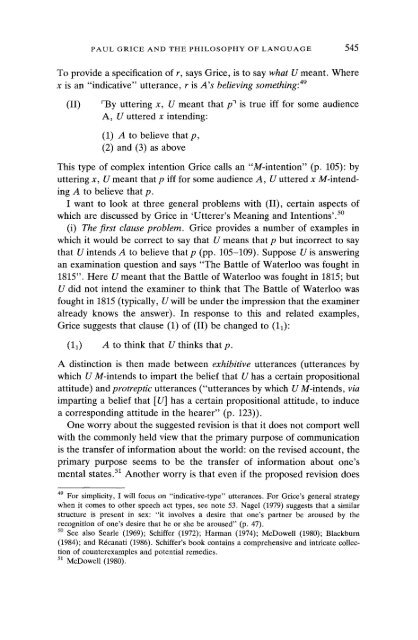Paul Grice and the philosophy of language
Paul Grice and the philosophy of language
Paul Grice and the philosophy of language
You also want an ePaper? Increase the reach of your titles
YUMPU automatically turns print PDFs into web optimized ePapers that Google loves.
PAUL GRICE AND THE PHILOSOPHY OF LANGUAGE 545<br />
To provide a specification <strong>of</strong> r, says <strong>Grice</strong>, is to say what U meant. Where<br />
x is an "indicative" utterance, r is A's believing something: 49<br />
(II)<br />
q3y uttering x, U meant that p7 is true iff for some audience<br />
A, U uttered x intending:<br />
(1) A to believe that p,<br />
(2) <strong>and</strong> (3) as above<br />
This type <strong>of</strong> complex intention <strong>Grice</strong> calls an "M-intention" (p. 105): by<br />
uttering x, U meant that p iff for some audience A, U uttered x M-intending<br />
A to believe that p.<br />
I want to look at three general problems with (II), certain aspects <strong>of</strong><br />
which are discussed by <strong>Grice</strong> in 'Utterer's Meaning <strong>and</strong> Intentions'. 5°<br />
(i) The first clause problem. <strong>Grice</strong> provides a number <strong>of</strong> examples in<br />
which it would be correct to say that U means that p but incorrect to say<br />
that U intends A to believe that p (pp. 105-109). Suppose U is answering<br />
an examination question <strong>and</strong> says "The Battle <strong>of</strong> Waterloo was fought in<br />
1815". Here U meant that <strong>the</strong> Battle <strong>of</strong> Waterloo was fought in 1815; but<br />
U did not intend <strong>the</strong> examiner to think that The Battle <strong>of</strong> Waterloo was<br />
fought in 1815 (typically, U will be under <strong>the</strong> impression that <strong>the</strong> examiner<br />
already knows <strong>the</strong> answer). In response to this <strong>and</strong> related examples,<br />
<strong>Grice</strong> suggests that clause (1) <strong>of</strong> (II) be changed to (11):<br />
(11) A to think that U thinks that p.<br />
A distinction is <strong>the</strong>n made between exhibitive utterances (utterances by<br />
which U M-intends to impart <strong>the</strong> belief that U has a certain propositional<br />
attitude) <strong>and</strong> protreptic utterances ("utterances by which U M-intends, via<br />
imparting a belief that [U] has a certain propositional attitude, to induce<br />
a corresponding attitude in <strong>the</strong> hearer" (p. 123)).<br />
One worry about <strong>the</strong> suggested revision is that it does not comport well<br />
with <strong>the</strong> commonly held view that <strong>the</strong> primary purpose <strong>of</strong> communication<br />
is <strong>the</strong> transfer <strong>of</strong> information about <strong>the</strong> world: on <strong>the</strong> revised account, <strong>the</strong><br />
primary purpose seems to be <strong>the</strong> transfer <strong>of</strong> information about one's<br />
mental states. 51 Ano<strong>the</strong>r worry is that even if <strong>the</strong> proposed revision does<br />
49 For simplicity, I will focus on "indicative-type" utterances. For Griee's general strategy<br />
when it comes to o<strong>the</strong>r speech act types, see note 53. Nagel (1979) suggests that a similar<br />
structure is present in sex: "it involves a desire that one's partner be aroused by <strong>the</strong><br />
recognition <strong>of</strong> one's desire that he or she be aroused" (p. 47).<br />
5o See also Searle (1969); Sehiffer (1972); Harman (1974); McDowell (1980); Blackburn<br />
(1984); <strong>and</strong> R6canati (1986). Schiffer's book contains a comprehensive <strong>and</strong> intricate collection<br />
<strong>of</strong> counterexamples <strong>and</strong> potential remedies.<br />
5a McDowell (1980).














